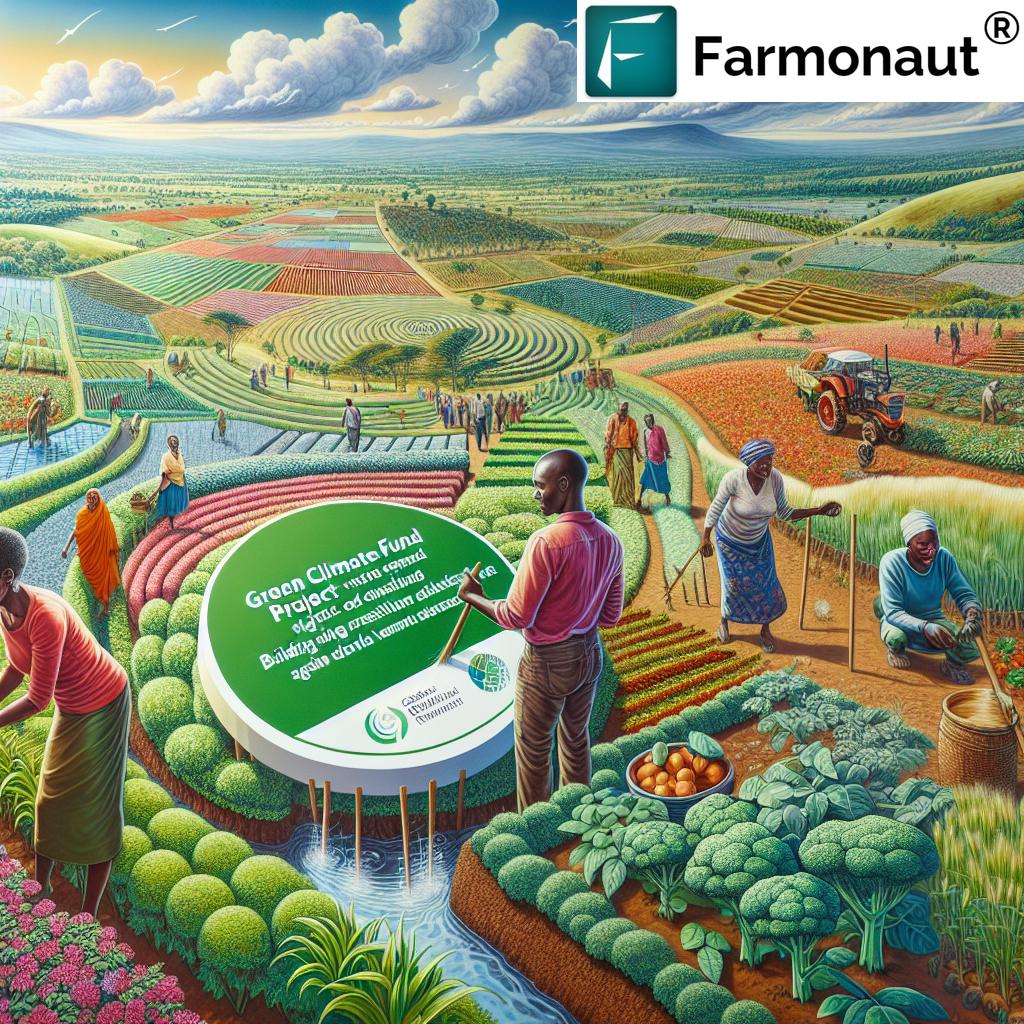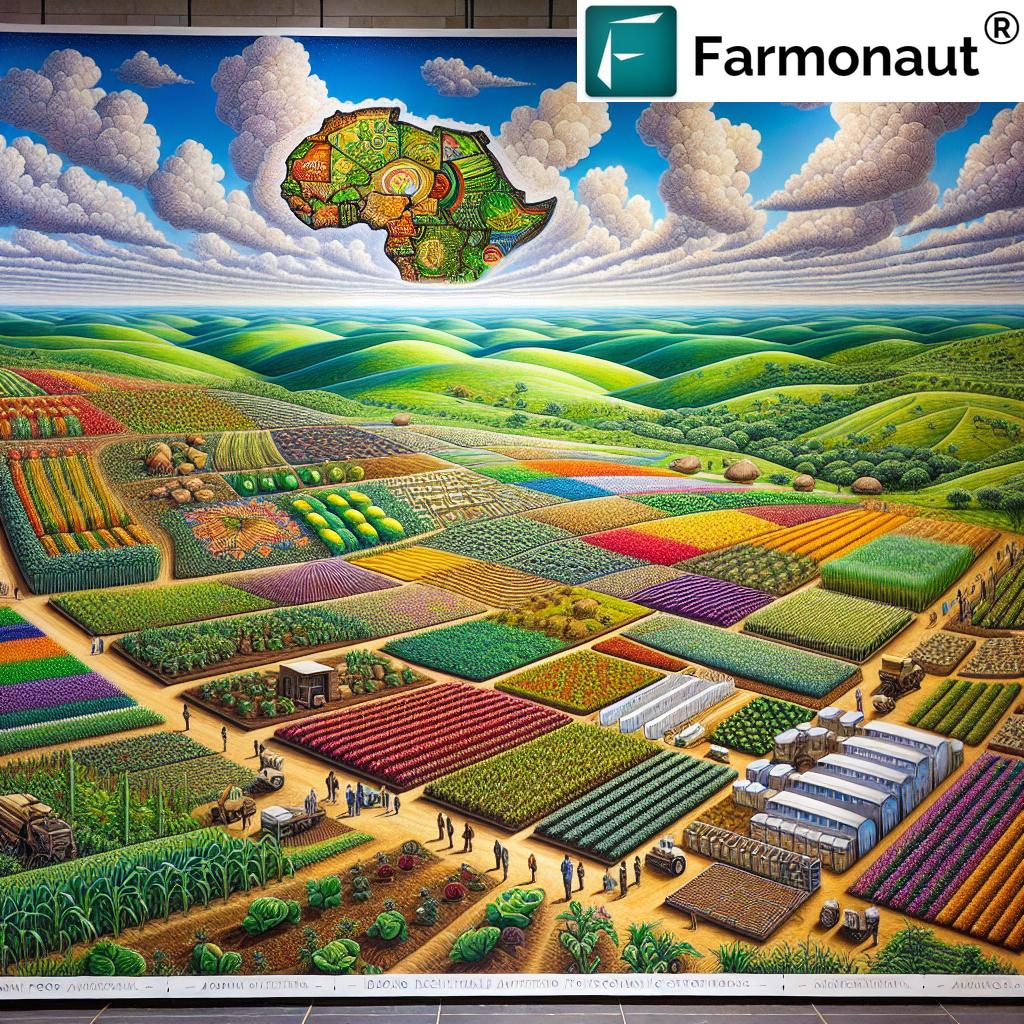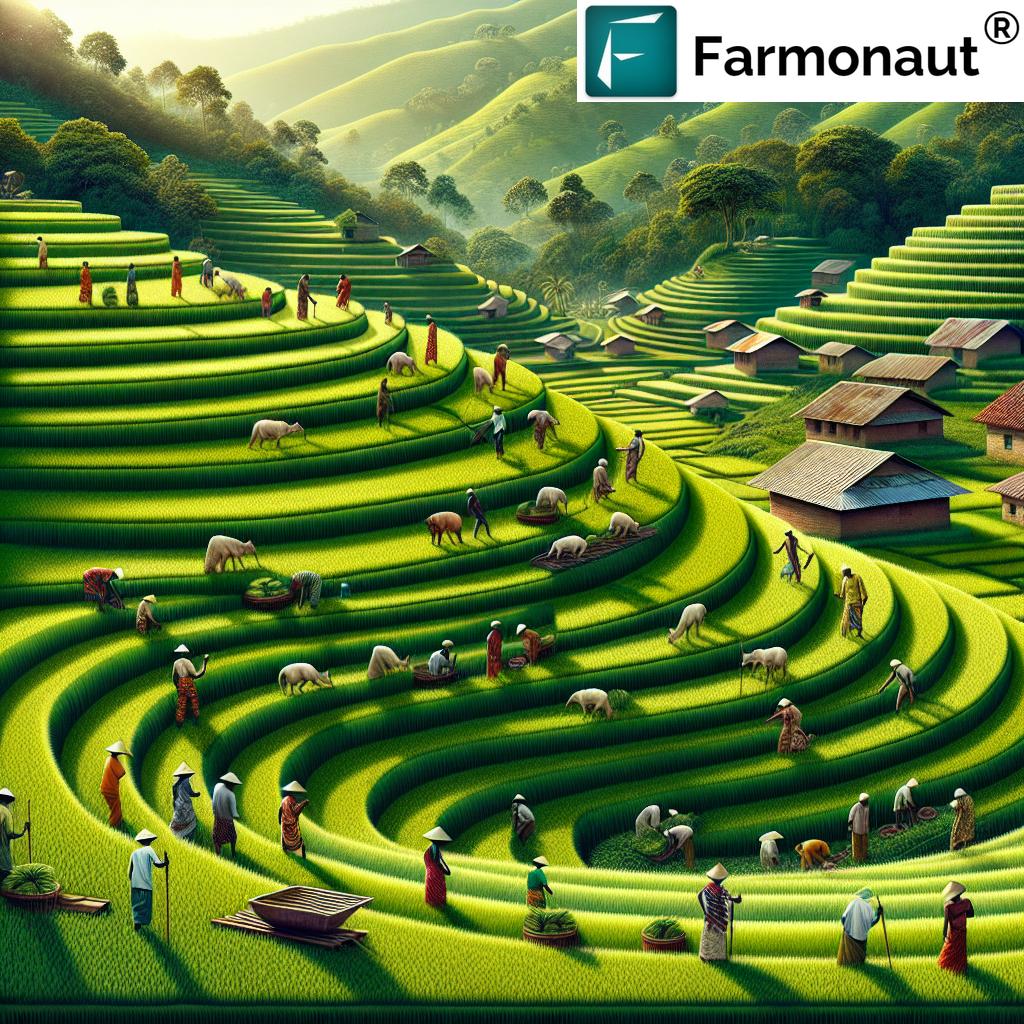Zimbabwe’s Agricultural Land Protection: Balancing Urban Development and Food Security
“Zimbabwe’s urban expansion threatens up to 30% of prime agricultural land, risking food security for millions.”
In the heart of southern Africa, Zimbabwe stands at a critical juncture where the preservation of agricultural land and the pressures of urban development collide. As we delve into this complex issue, we’ll explore the challenges, policies, and innovative solutions shaping the future of Zimbabwe’s agricultural landscape and urban growth.
The Urgent Need for Agricultural Land Protection
Zimbabwe’s agricultural sector has long been the backbone of its economy, providing livelihoods for millions and ensuring food security for the nation. However, recent trends in urban expansion have begun to encroach upon valuable agricultural land, threatening this delicate balance.
During a recent Zimbabwe Online Agricultural College graduation ceremony, Lands, Agriculture, Fisheries, Water and Rural Development Minister Anxious Masuka highlighted the critical need for adherence to formal procedures for any changes in land use. His stern warning against illegal land development, particularly by land barons targeting spaces designated for agriculture, underscores the government’s commitment to protecting these vital resources.

The Intersection of Urban Development and Agricultural Land
The conflict between urban growth and agricultural preservation is not unique to Zimbabwe, but it takes on particular urgency in a country where agriculture plays such a central role. As cities like Harare expand, the temptation to convert nearby farmland into residential or commercial zones grows stronger. However, this short-term gain comes at a significant long-term cost to food production and national food security.
Minister Masuka’s call for urban planners to focus on vertical expansion rather than sprawling developments is a crucial strategy in this balancing act. By building upwards instead of outwards, cities can accommodate growing populations without sacrificing precious agricultural zones.
The Role of Agricultural Land Use Policy
At the core of Zimbabwe’s efforts to protect its agricultural resources is a robust agricultural land use policy. This policy framework aims to:
- Clearly define and protect agricultural zones
- Establish formal procedures for land use changes
- Promote sustainable farming practices
- Encourage urban agriculture within city limits
- Foster collaboration between various government ministries for transparent land management
The emphasis on following proper legal procedures for land use changes reflects a strategic approach to maintaining Zimbabwe’s agricultural integrity. It’s a delicate balance between allowing for necessary urban development and safeguarding the nation’s food production capabilities.
Urban Agriculture Planning: A Solution for Growing Cities
As we consider the challenges of expanding urban areas, urban agriculture planning emerges as a promising solution. By integrating food production into urban landscapes, cities can:
- Reduce pressure on rural agricultural land
- Improve local food security
- Create green spaces within urban environments
- Provide employment opportunities for urban residents
Urban agriculture takes many forms, from community gardens to rooftop farms. In Zimbabwe, there’s growing interest in innovative approaches like vertical farming expansion, which maximizes food production in limited urban spaces.
“Vertical farming in Zimbabwe’s cities could potentially increase crop yields by 400% while preserving valuable agricultural land.”
Vertical Farming: A Game-Changer for Urban Food Production
Vertical farming represents a revolutionary approach to urban agriculture, offering numerous benefits:
- Significantly higher yields per square meter compared to traditional farming
- Year-round crop production, independent of weather conditions
- Reduced water usage through efficient irrigation systems
- Minimal transportation costs for urban-grown produce
- Opportunity to repurpose unused urban spaces for food production
By embracing vertical farming expansion, Zimbabwe can address both urban development needs and food security concerns simultaneously. This innovative approach aligns perfectly with Minister Masuka’s call for upward rather than outward urban growth.
Combating Illegal Land Development
One of the most pressing challenges in Zimbabwe’s land management is the prevention of illegal land development. This issue threatens not only agricultural production but also undermines the rule of law and orderly urban planning. To address this, the government is taking several steps:
- Strengthening enforcement of existing land use regulations
- Implementing harsher penalties for illegal land conversion
- Increasing public awareness about the importance of agricultural land preservation
- Enhancing collaboration between law enforcement and agricultural authorities
These efforts aim to create a more transparent and accountable system for land management, ensuring that any changes in land use go through proper channels and consider the long-term impacts on food security and economic stability.
The Role of Technology in Agricultural Innovation
In the face of these challenges, agricultural innovation and technology play a crucial role in Zimbabwe’s efforts to boost productivity and protect valuable farmland. Advanced farming techniques and digital tools are transforming the agricultural landscape, offering solutions that can help farmers produce more with less land.
Some key technological advancements include:
- Precision agriculture using GPS and satellite imaging
- Drone technology for crop monitoring and pest control
- Smart irrigation systems for water conservation
- Soil sensors for optimized fertilizer use
- Mobile apps providing real-time agricultural data and advice
These innovations not only increase yields but also promote sustainable farming practices, reducing the pressure to convert more land for agricultural use.
Explore how Farmonaut’s satellite-based farm management solutions can revolutionize your agricultural practices. Try our web app today!

The Importance of Agricultural Education and Research
Minister Masuka’s commendation of higher learning institutions and vocational training centers highlights the critical role of education in advancing Zimbabwe’s agricultural sector. These institutions are at the forefront of:
- Developing new crop varieties suited to local conditions
- Researching sustainable farming methods
- Training the next generation of agricultural professionals
- Promoting technological adoption in farming communities
The focus on agricultural education and research aligns with the broader Education 5.0 policy, which aims to develop human capital and foster innovation within the agricultural sector. This investment in knowledge and skills is crucial for improving productivity through mechanization and continuous research.
Sustainable Urban Development Strategies
As we look to the future, sustainable urban development strategies will be key to balancing urban growth with agricultural preservation. Some promising approaches include:
- Mixed-use zoning that integrates residential, commercial, and agricultural spaces
- Green belt policies to limit urban sprawl and protect surrounding farmland
- Incentives for brownfield development to reduce pressure on greenfield sites
- Implementation of smart city technologies to optimize resource use
These strategies can help create more compact, efficient urban areas that minimize their impact on surrounding agricultural land while still meeting the needs of growing populations.
Food Security Strategies in the Face of Urban Expansion
Ensuring food security amidst rapid urbanization requires a multifaceted approach. Zimbabwe’s strategies include:
- Promoting urban and peri-urban agriculture
- Strengthening rural-urban food supply chains
- Investing in food storage and processing infrastructure
- Supporting smallholder farmers through training and resources
- Encouraging dietary diversification to reduce reliance on specific crops
These initiatives aim to create a more resilient food system that can withstand the pressures of urban growth and climate change.

Agricultural Mechanization: Boosting Productivity
Agricultural mechanization is a key component of Zimbabwe’s strategy to increase farm productivity and reduce the need for land expansion. By adopting modern farming equipment and techniques, farmers can:
- Increase yields on existing farmland
- Reduce labor requirements and production costs
- Improve the timeliness of farming operations
- Enhance the quality of agricultural products
The government’s focus on promoting mechanization through education and support programs is crucial for achieving these benefits and ensuring the long-term viability of Zimbabwe’s agricultural sector.
Harness the power of satellite technology for precision agriculture. Access Farmonaut’s API for real-time agricultural data. Explore our API solutions
Rural Development Initiatives: Strengthening the Agricultural Base
While much attention is focused on urban areas, rural development initiatives play a vital role in Zimbabwe’s overall agricultural strategy. These programs aim to:
- Improve rural infrastructure, including roads and irrigation systems
- Provide access to markets and financial services for rural farmers
- Promote agro-processing industries in rural areas
- Enhance rural education and healthcare to stem urban migration
By strengthening rural communities and making agriculture more profitable, these initiatives can help reduce the pressure on urban areas and preserve valuable agricultural land.
Collaboration and Transparency in Land Management
Minister Masuka’s call for enhanced collaboration among various government ministries underscores the need for a holistic approach to land management. This collaborative effort aims to:
- Streamline decision-making processes for land use changes
- Ensure transparency in land allocation and development
- Facilitate information sharing between agricultural and urban planning departments
- Develop comprehensive land use plans that balance various needs
By fostering this inter-ministerial cooperation, Zimbabwe can create more effective and sustainable land use policies that protect agricultural resources while accommodating urban growth.
The Role of Technology in Land Use Planning
Advanced technology is playing an increasingly important role in land use planning and agricultural management. Tools such as Geographic Information Systems (GIS) and remote sensing are revolutionizing how we understand and manage land resources. These technologies allow for:
- Accurate mapping of agricultural zones and urban areas
- Real-time monitoring of land use changes
- Predictive modeling of urban growth patterns
- Assessment of soil quality and crop suitability
By leveraging these technological advancements, Zimbabwe can make more informed decisions about land use and better protect its valuable agricultural resources.
Revolutionize your farming practices with Farmonaut’s mobile apps. Download now for iOS and Android!


Zimbabwe’s Agricultural Land Use and Protection Measures
| Land Use Category | Current Area (Estimated %) | Protection Measures | Responsible Authorities |
|---|---|---|---|
| Urban Agriculture | 5% | Zoning regulations, urban farming incentives | Ministry of Local Government, Urban Councils |
| Commercial Farming | 40% | Land tenure security, agricultural subsidies | Ministry of Lands, Agriculture, Fisheries, Water and Rural Development |
| Smallholder Farming | 35% | Extension services, input support programs | Agricultural Extension Services (Agritex) |
| Protected Agricultural Zones | 20% | Strict land use regulations, conservation policies | Environmental Management Agency, Ministry of Environment |
The Economic Impact of Agricultural Land Protection
Protecting agricultural land is not just about food security; it’s also a crucial economic strategy. Agriculture remains a significant contributor to Zimbabwe’s GDP and employment. By preserving farmland, we ensure:
- Continued export earnings from agricultural products
- Stable employment for a large portion of the population
- Reduced reliance on food imports
- Support for rural economies and livelihoods
The economic benefits of a strong agricultural sector ripple through the entire economy, underlining the importance of balancing urban development with agricultural preservation.
The Future of Zimbabwe’s Agricultural Landscape
As we look to the future, the path forward for Zimbabwe’s agricultural sector and urban development is one of balance and innovation. By embracing new technologies, implementing smart policies, and fostering collaboration between various stakeholders, Zimbabwe can create a sustainable model that protects its agricultural heritage while accommodating the needs of a growing urban population.
Key areas of focus for the future include:
- Continued investment in agricultural research and innovation
- Expansion of sustainable urban farming practices
- Development of climate-resilient farming techniques
- Enhancement of rural infrastructure to support agricultural communities
- Implementation of smart city technologies to optimize urban resource use
By addressing these areas, Zimbabwe can create a resilient and productive agricultural sector that coexists harmoniously with its urban centers.
Conclusion: A Balanced Approach for Sustainable Growth
Zimbabwe’s journey to balance urban development and agricultural land protection is a complex but crucial endeavor. By implementing robust policies, embracing technological innovations, and fostering collaboration between various sectors, the nation can protect its valuable agricultural resources while meeting the needs of its growing urban population.
The warnings and directives issued by Minister Masuka serve as a clear signal of the government’s commitment to this balanced approach. As we move forward, it will be essential for all stakeholders – from policymakers and urban planners to farmers and citizens – to work together in preserving Zimbabwe’s agricultural heritage and ensuring a food-secure future for generations to come.
In this era of rapid change and development, Zimbabwe stands at a crossroads. The decisions made today regarding land use and agricultural protection will shape the nation’s food security, economic stability, and environmental sustainability for decades to come. By taking a thoughtful, innovative approach to these challenges, Zimbabwe can emerge as a model for sustainable development in Africa and beyond.
Frequently Asked Questions (FAQ)
- What is the main challenge facing Zimbabwe’s agricultural land?
The primary challenge is balancing urban expansion with the preservation of valuable agricultural land to ensure food security and economic stability. - How is the government addressing illegal land development?
The government is implementing stricter enforcement of land use regulations, increasing penalties for illegal conversion, and promoting public awareness about the importance of agricultural land preservation. - What role does vertical farming play in Zimbabwe’s agricultural future?
Vertical farming is seen as a potential solution to increase food production in urban areas without encroaching on existing agricultural land, potentially increasing crop yields by up to 400%. - How is technology being used to protect agricultural land?
Technologies such as GIS, remote sensing, and precision agriculture tools are being used for accurate land mapping, real-time monitoring of land use changes, and optimizing agricultural productivity. - What are some key strategies for ensuring food security in Zimbabwe?
Strategies include promoting urban and peri-urban agriculture, strengthening rural-urban food supply chains, investing in food storage infrastructure, and supporting smallholder farmers through training and resources.
Explore Farmonaut’s comprehensive satellite-based farm management solutions. Check out our API Developer Docs to integrate cutting-edge agricultural technology into your operations.












Such an important topic! Balancing urban development with the protection of agricultural land is crucial for Zimbabwe’s future. Ensuring that food security is not compromised while promoting urban growth is a delicate challenge, but it’s one that needs thoughtful solutions. The integration of sustainable practices and smart planning will be key in maintaining both agricultural productivity and urban expansion. Thank you for shedding light on this critical issue that impacts both the economy and the well-being of the population.